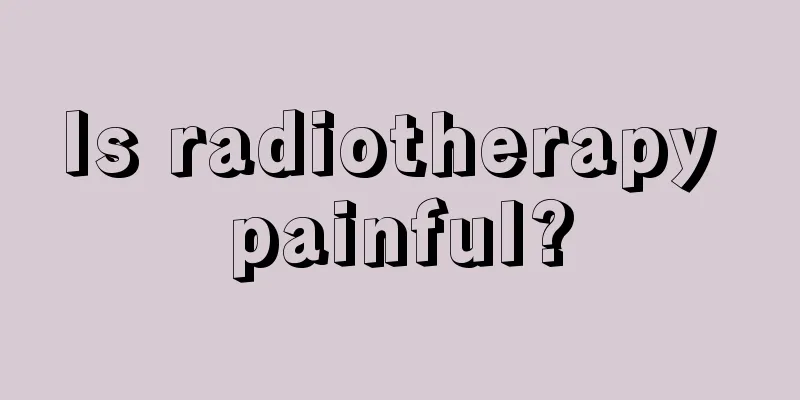Is radiotherapy painful?

|
Radiation therapy is a treatment method used for cancer patients. Generally speaking, if a person's physical condition makes surgery impossible, radiotherapy can be used to relieve and treat tumor symptoms. One of the benefits of radiotherapy is that it is painless, but there will be some discomfort. In addition, radiotherapy also has certain side effects. Below we will introduce you to the relevant knowledge of radiotherapy in detail! 1. What is radiotherapy? Radiotherapy is an anti-tumor method that uses radiation to irradiate tumors to inhibit or kill tumor cells. Radiotherapy, together with surgery and chemotherapy, is known as the "three horses" in the fight against tumors. Radiotherapy is one of the main local means of combating tumors. Almost any tumor in any part of the body can be treated with radiotherapy. According to statistics, about 70% of cancer patients need to receive radiotherapy at some stage during the course of the disease. 2. Is radiotherapy painful? Radiation therapy is also known as radiotherapy. This is a method in which rays of specific frequency or wavelength penetrate a certain depth from the body surface to reach the lesion, and use the high energy carried by the rays to "heat" the lesion, causing the malignant tumor or residual malignant cells to die and calcify. Patients do not feel pain during radiotherapy and can relax. It’s just that the side effects after radiotherapy make patients feel uncomfortable for a period of time, and the degree of discomfort varies depending on the patient’s tolerance. Generally, there will be symptoms such as nausea, fatigue, loss of appetite, and hair loss. During this period, eating more watermelon and taking some drugs with whitening effects as prescribed by the doctor are good measures to reduce the reaction to radiotherapy! 3. Side effects of radiotherapy Systemic reaction: manifested as a series of functional disorders and imbalances, such as lack of energy, decreased appetite, physical weakness, fatigue, nausea and vomiting, bloating after eating, etc. Mild cases may not require treatment, while severe cases should be treated in time, combined with traditional Chinese medicine to improve the body's immunity. Local reactions: a. Skin: Dry skin is characterized by itching, pigmentation and peeling, which can produce permanent light brown spots. Moist skin manifests as eczema and blisters at the irradiated site. In severe cases, it may cause erosion and ulceration. If there is ulceration, MEBO moist burn ointment can be applied to the site and radiotherapy should be suspended. b. Mucosal reactions: Mild: Symptoms include redness, swelling, erythema, congestion of the oral mucosa, and decreased secretions. Dry mouth, slight pain, and slightly less food intake. Moderate: Oropharyngeal area is obviously congested and edematous, with spotted white film and ulcers, obvious pain, and difficulty eating. Severe: The oral mucosa is extremely congested, eroded, and bleeding, fused into a white film, the ulcers worsen, and there is purulent secretion, severe pain, inability to eat, and occasional fever. During this period, radiotherapy needs to be suspended and oral care should be strengthened. |
<<: Can the spots on the bridge of the nose be removed
>>: Can I swim if I have urticaria
Recommend
How much does hamartoma surgery cost approximately
People nowadays have learned to inquire about the...
What should I eat if I want to build muscle?
It is very handsome to have a muscular body, so m...
Symptoms before death of patients with advanced liver cancer
As the pressure of life is getting greater and gr...
There are red bloodshot around the eyelids
We all know that the stratum corneum of the skin ...
What to do if you can't eat in the late stage of liver cancer
If the patient is concerned about the possibility...
How long can you live after the operation for malignant chondrosarcoma
Chondrosarcoma is a serious bone tumor, and its m...
Can stomach cancer cause fever? These 3 situations will
Generally speaking, gastric cancer can cause feve...
What are the symptoms of bladder cancer? Found four conditions may be bladder cancer
Bladder cancer is a very common malignant tumor o...
The saliva becomes very sticky
The sticky saliva is usually caused by dry mouth,...
How much does chemotherapy cost after colon cancer surgery
Colon cancer is mostly caused by the malignant tr...
What are dentures made of
Teeth not only play the role of chewing food in o...
Early symptoms of bone cancer
Early symptoms of bone cancer: 1. Early symptoms ...
Contraindications of external counterpulsation
The heart is not only a hematopoietic organ, but ...
What should you pay attention to in home care for lymphoma
Experts point out that in addition to general car...
The harm of boiling eggs in beer
Beer is a kind of alcoholic beverage that is deep...









